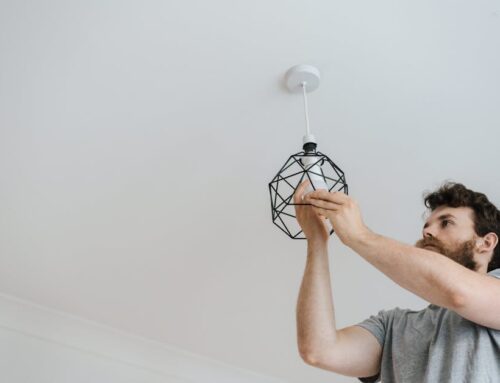The Rise of Home Security Systems
Home security systems have seen a significant increase in adoption over the past decade. This growth can be attributed to various factors including technological advancements, rising crime rates, and increased awareness of personal and property safety.
Technological Advancements
The rapid development of technology has revolutionized the home security industry. Modern security systems are far more advanced than their predecessors, incorporating features such as high-definition cameras, smart locks, and integration with other smart home devices. The incorporation of artificial intelligence (AI) and machine learning has further enhanced the capability of these systems.
- AI and Machine Learning – Provide real-time analysis and faster response times by recognizing patterns and anomalies.
- Smart Integration – Security systems now integrate seamlessly with other smart home devices, allowing for convenient control via smartphones or tablets.
Rising Crime Rates
According to the Federal Bureau of Investigation (FBI), property crime remains a significant issue in many areas. The increased rate of burglaries and other related crimes has driven homeowners to seek out effective solutions for protecting their property and loved ones. Here are some recent statistics:
| Year | Burglary Incidents (in millions) |
|---|---|
| 2018 | 2.2 |
| 2019 | 2.0 |
| 2020 | 1.9 |
| 2021 | 1.7 |
While the number of incidents has been decreasing, the perceived threat of burglary and theft remains a key motivator for homeowners to invest in security systems.
Increased Awareness and Accessibility
Another critical factor in the rise of home security systems is increased consumer awareness and the affordability of these systems. Enhanced marketing efforts and positive reviews from users have made more people cognizant of the benefits of having a home security system. Additionally, the cost of these systems has become more accessible, allowing a broader demographic to invest in home security solutions.
- Affordability – Competitive pricing and flexible payment plans have made home security systems more attainable.
- Marketing and Reviews – Effective advertising and positive word-of-mouth have educated consumers on the importance and benefits of home security systems.
The rise in home security systems is a multifaceted phenomenon rooted in technological progress, societal concerns, and the increased market penetration of these systems. This trend suggests a growing acknowledgement of the importance of safeguarding one’s home and personal belongings.
Key Features of Modern Home Security Systems
Modern home security systems are designed to provide comprehensive protection and peace of mind for homeowners. These systems integrate a variety of advanced features that work together to enhance security, convenience, and control. Below are some key features commonly found in modern home security systems:
1. Surveillance Cameras: High-definition cameras are a central component of most home security systems. They provide real-time video monitoring and recording, allowing homeowners to keep an eye on their property from anywhere using mobile devices. Many cameras come equipped with night vision, motion detection, and the ability to store footage in the cloud.
2. Motion Sensors: Motion sensors detect unusual movement within their range and can trigger alarms or alerts. These sensors are typically placed at entry points such as doors and windows, as well as in key interior areas. They are crucial for detecting intrusions and ensuring prompt responses to potential threats.
3. Door and Window Sensors: These sensors are installed on doors and windows and activate when the protected entry point is opened. They are an essential component for the perimeter security of a home, alerting homeowners or security services to unauthorized access attempts.
4. Smart Locks: Smart locks allow homeowners to remotely lock and unlock doors using smartphones or other connected devices. These locks can also provide access logs, showing who has entered or exited the home, and some models can integrate with digital assistants for voice control.
5. Alarm Systems: Modern alarm systems are designed to deliver immediate notifications in the event of a security breach. They can emit loud sounds to deter intruders and simultaneously send alerts to homeowners and, if subscribed to, monitoring services. Advanced systems can distinguish between different types of alarms, such as those for fire or carbon monoxide detection.
6. Environmental Sensors: Besides detecting intrusions, many security systems also include sensors that monitor environmental hazards. These can include smoke detectors, carbon monoxide detectors, and flood sensors. Such features help in providing a holistic safety net for the home.
7. Remote Monitoring and Control: The ability to monitor and control the security system remotely is arguably one of the most significant advancements. Through mobile apps, homeowners can view live video feeds, receive alerts, and manage system settings from anywhere. This control extends to other smart home devices integrated into the security system.
8. Integration with Smart Home Devices: Modern security systems often integrate with other smart home devices such as lights, thermostats, and voice-activated assistants. This interconnected setup not only enhances home security but also adds to the convenience of managing various home functions from a central platform.
The integration of these features in modern home security systems represents a significant advancement in home protection, aiming to provide a seamless, user-friendly experience while maintaining robust security measures.
Financial Benefits of Home Security Systems
Investing in a home security system can provide significant financial advantages, making it a wise decision for many homeowners. Here are some of the key financial benefits:
Reduction in Homeowners Insurance Premiums
Many insurance providers offer discounted premiums to homeowners who have installed a security system. Security systems are seen as a proactive approach to mitigating risks such as theft, vandalism, and fire damage. Savings can vary, but some insurance companies provide discounts of up to 20% on homeowners insurance for homes equipped with professional security systems.
Preventing Loss Due to Theft and Vandalism
The primary function of a home security system is to deter potential burglars. Allied’s security packages, which include police, medical, and fire alarm monitoring, provide comprehensive protection. This reduces the likelihood of loss, damage, and the costs associated with theft or vandalism. In addition, surveillance systems can provide valuable evidence to law enforcement, increasing the chances of recovering stolen property.
Enhanced Energy Management
Modern security systems often include features for home automation, such as smart thermostats and lighting controls. These systems can help manage energy use more efficiently, leading to savings on utility bills over time. By optimizing the heating, cooling, and lighting of your home, you can reduce unnecessary energy consumption and lower your overall expenses.
Increase in Property Value
Many home buyers see value in homes already equipped with a security system. Allied’s smart home security systems, with their advanced features and user-friendly controls, can make a property more attractive in the competitive real estate market. This can potentially lead to a higher resale value and a quicker sale.
Affordable Monitoring Options
With Allied, homeowners have access to affordable monitoring services starting at just $19.95 per month. This includes not just basic monitoring but also the advanced features of a smart home security system. Allied’s price match guarantee ensures you are getting the best value for your investment.
Overall, the financial benefits of home security systems extend beyond immediate cost savings. The long-term advantages, increased home value, and peace of mind that come with a comprehensive security system make it a smart investment for any homeowner.
Impact of Security Systems on Property Values
Investing in home security systems has a noticeable impact on property values. Several studies indicate that properties equipped with security systems tend to have higher market values compared to those without such installations.
A report from the National Association of Realtors highlights that homes with security systems often attract higher offers from buyers. Potential buyers perceive these homes as safer and more secure, which increases their willingness to pay a premium.
Furthermore, the presence of a comprehensive security system can lead to reduced home insurance premiums. Insurance companies recognize the decreased risk of burglary and other incidents, thereby offering discounted rates to homeowners. This reduction in ongoing costs can be appealing to prospective buyers and add to the overall value of the property.
It’s also worth noting that security systems can be a significant selling point in real estate markets. Real estate agents often list security features prominently in property descriptions, knowing that it can attract more attention and differentiate the property from similar listings.
Research from SafeHome.org supports these claims, demonstrating that properties with visible security measures deter criminal activities. The increased sense of security translates into a higher perceived value of the property, facilitating quicker sales and better market performance.
Overall, investing in a home security system not only enhances the safety and peace of mind for current residents but also provides a tangible boost to the property’s market value.
How Home Security Systems Contribute to Community Safety
Investing in home security systems extends beyond individual property protection and plays a crucial role in enhancing overall community safety. Here are some key ways that home security systems contribute to safer neighborhoods:
Crime Deterrence
Visible security systems, such as cameras and alarm signs, can deter criminal activity. According to the Urban Institute, neighborhoods with a higher prevalence of security measures experience fewer break-ins and other crimes. Criminals are less likely to target homes that show signs of active surveillance, thereby decreasing the overall crime rate in the area.
Emergency Response
Home security systems often include features that facilitate faster emergency response times. Systems equipped with professional monitoring services automatically alert law enforcement, fire departments, or medical services in case of emergencies. According to data from the Security Industry Association (SIA), this quick alert mechanism can significantly reduce the potential damage and injury that could occur during emergencies, benefitting the entire community.
Community Awareness
Many modern home security systems offer mobile apps and online platforms where residents can share real-time updates about suspicious activities. Platforms like Ring Neighbors or Nextdoor allow community members to stay informed and vigilant, promoting a collective effort to maintain safety. This increased awareness cultivates a proactive stance against crime in the community.
Shared Surveillance Networks
Some neighborhoods implement shared surveillance networks where footage from individual home security cameras is pooled for collective access. According to a study by the Brookings Institution, these collaborative surveillance efforts can significantly enhance the ability to monitor and respond to suspicious activities, benefiting all residents within the network.
Creating a Safety Culture
Installing home security systems can influence a change in community behavior by fostering a culture of safety and vigilance. When residents observe their neighbors taking security seriously, they are more likely to follow suit. As noted by the National Safety Council (NSC), cultivating a communal attitude toward safety can reinforce preventive measures and adherence to security protocols, contributing to a safer environment for all.
Overall, the integration of home security systems plays a vital role not only in protecting individual homes but also in enhancing the safety and security of entire communities. By deterring crime, ensuring quicker emergency responses, and fostering a culture of vigilance, these systems create a safer and more connected living environment for everyone involved.











